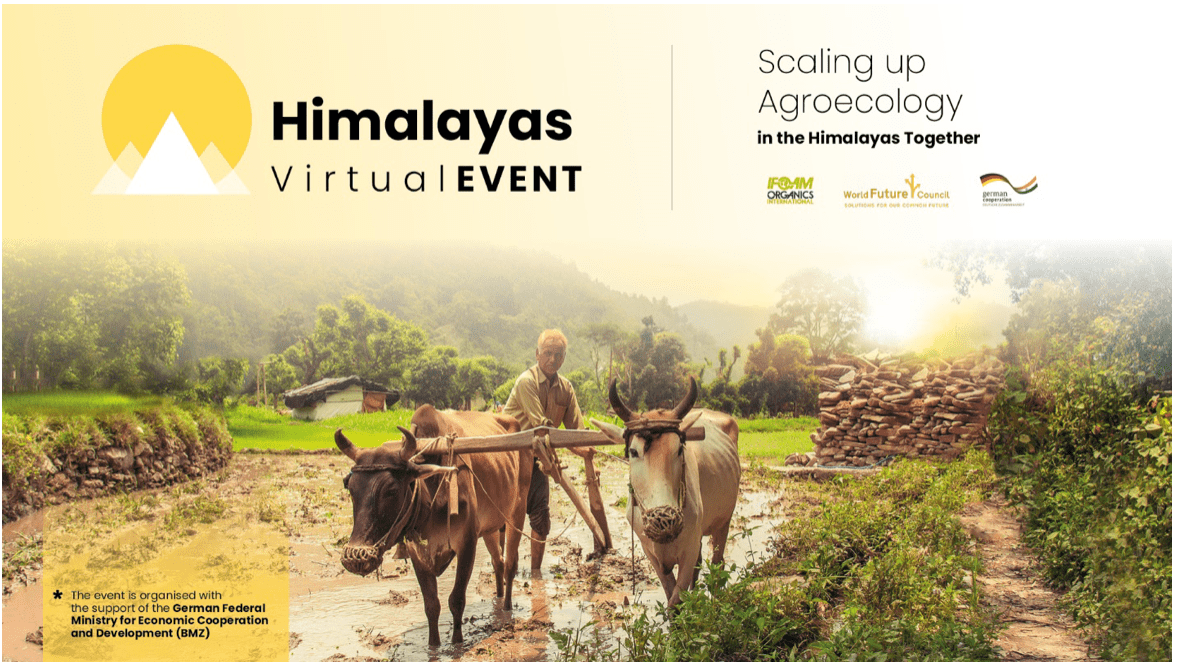The global restoration project revolves around agroecology and producing organic food for human consumption based on natural systems landscapes. Policymakers have suggested proposals, reforms, and taken innovative measures to transform food and agricultural systems while promoting agroecology worldwide, there is still a lot more to do.
To have a starting point, an event had to be organized where key decision makers would share and take up concrete measures and policies that support agroecology and organic agriculture. To realize this idea, IFOAM – Organics International teamed up with the World Future Council (WFC) with the support of the German Federal Ministry for Economic Cooperation and Development (BMZ) to organize a digital event. That is how the Himalayas virtual event came to be.
Under the theme, “Scaling up Agroecology in the Himalayas Together”, high level experts from India, Bhutan and Nepal came together from 28-29 April in 2021 to provide in-depth analyses of approaches and tools that promote and implement the 10 elements of agroecology and the four principles of organic agriculture on a policy level in the Himalaya region. The purpose of organizing this forum was to increase awareness of the need to redesign current food and socioeconomic systems and create conducive policy frameworks for sustainable, equitable, and resilient food systems.
The Himalayas are a region where great innovations are currently underway which is why IFOAM – Organics International et.al brought together policymakers, policy advisors, advocates and researchers from the region to exchange knowledge, learn from each other and work together towards a unified vision. By establishing one brand, the countries in the Himalayan region can create integrated networks to manage their mountain ecosystem and can scale up agroecology through innovative human solutions.
The Need for Sustainable Agricultural Systems
The Himalaya region is part of the Hindu Kush Himalayan (HKH) region that spreads over an area of 3,500 kilometers, encompassing over eight countries. It constitutes a large reservoir of water, with its river basins providing water to 1.9 billion people. But the area is also crucial for the ecosystem services provided, which ensures livelihoods to a population of around 240 million people. In the HKH mountain system, traditional agriculture still represents the main occupation and their livelihoods.
To improve livelihoods and preserve natural resources, Bhutanese, Nepalese, and Indian policymakers recognize the need to make the transition toward sustainable agricultural systems. The states have implemented policies and programs that include extensive budgets to support agroecology and organic farming. Xhona Hysa, a global policy expert for IFOAM – Organics International, stresses that the agricultural budget allocated for organic and agricultural practices remain disproportionately low as compared to those provided to conventional farming. She stated that countries must take a holistic approach when it comes to mainstreaming sustainability in policymaking. The most successful case-studies by IFOAM – Organics International involves overarching, integrated approaches that spanned from natural resource management to socio-economic measures that improve livelihoods.
IFOAM – Organics International upholds the principles of organic to support both human life and ecology, while advocating for the improvement of the conditions of farmers. The members of IFOAM – Organics International aim to transform food systems with a systemic and holistic approach that provides an effective pathway for achieving Sustainable Development Goals. With this vision and guidance in mind, IFOAM – Organics International and WFC jointly organized this forum with the hope that there will be collaborative efforts between policymakers to adapt policies promoting sustainable food and resilient agricultural practices in the Himalayan region.
The role of facilitators in promoting food and farming systems
IFOAM – Organics International and the WFC have the role of facilitating dialogue in the region and sharing best-case practices from other regions. To achieve this, they focus on identifying, developing, and disseminating effective, future-just solutions for current challenges that humanity is facing. They also aim to promote sustainable and future-just laws and measures worldwide that support biodiversity and have the farmers growing our food at heart.
Through its members and experts, IFOAM – Organics International communicate directly to policymakers, and the results of their work feeds into their educational work in supporting decision-makers in implementing good policies on sustainable agriculture. They create synergies between policymakers of international organizations (FAO, IFAD, etc.) and national stakeholders (ministries, members of parliament, development actors, civil society, academia and media).
The holistic approach suggested by IFOAM – Organics International refers to initiating an integrative, systemic approach that promotes organic farming as a lifestyle and a healthy way of having a livelihood. This would include the inclusion and recognition of the work that women and youth play in our food systems. Surya Kumar, the Deputy Manager Director of the National Bank for Agriculture and Rural Development in India (NABARD) supported this idea when he stated,
“We need to implement a systemic approach in which the whole community can learn and contribute, including women and youth.”

